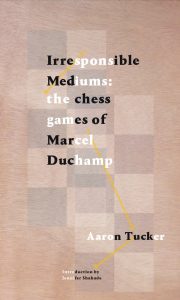
Aaron Tucker is the author of the forthcoming Virtual Weaponry: The Militarized Internet in Hollywood War Films (Palgrave Macmillan) and irresponsible mediums: the chesspoems of Marcel Duchamp (Bookthug Press). He has also published two other previous books: Interfacing with the Internet in Popular Cinema(Palgrave Macmillan) along with the poetry collection punchlines(Mansfield Press). More information can be found at Wikipedia, ELMCIP, and Scalar.
His current collaborative project, Loss Sets, translates poems into sculptures which are then 3D printed (http://aarontucker.ca/3-d-poems/); he is also the co-creator of The ChessBard, an app that transforms chess games into poems (http://chesspoetry.com).
An earlier version of punchlines was released by above/ground in the summer of 2013. His poetic works and reviews have been published across Canada. His previous chapbook, apartments, was shortlisted for the 2010 bpNichol Chapbook award.
In addition, he is a lecturer in the English department at Ryerson University where he is currently teaching essay writing and digital literacy to first year students. You can reach him atucker[at]ryerson[dot]ca
 Jody Miller is a software developer and language enthusiast, and is keen for opportunities to combine the two. Whether its studying languages (including Mandarin, French, and Japanese) or performing stand-up comedy, he believes that software can help us do better. While his comedy generating robot (based on Google n-gram data) has yet to come up with any solid jokes, he holds out hope for the future.
Jody Miller is a software developer and language enthusiast, and is keen for opportunities to combine the two. Whether its studying languages (including Mandarin, French, and Japanese) or performing stand-up comedy, he believes that software can help us do better. While his comedy generating robot (based on Google n-gram data) has yet to come up with any solid jokes, he holds out hope for the future.
He also studies Human Anatomy and Physiology at Ryerson University, swims religiously, and occasionally fosters dogs and cats. You can reach him at jody.miller@askur.ca.
We’re proud to have the support of the Centre for Digital Humanities (CDH) at Ryerson University. The Centre for Digital Humanities (CDH) engages in collaborative research at the critical intersection of the material and the digital, contributing to scholarly and societal knowledge about cultural objects, makers, and users. Through the iterative process of designing online environments for the preservation, visualization, and analysis of cultural texts and histories, CDH projects investigate the ways in which digital mediation fosters new ways of critical thinking through making. The CDH sustains a dynamic synergy between research and teaching by involving students in digital projects in the classroom and by training future researchers in digital humanities theory and practice. We are committed to public engagement through open access electronic publishing and interactive processes rooted in innovative knowledge mobilization in a global community. The CDH welcomes Ryerson-based proposals for interdisciplinary projects in the digital humanities and is able to provide limited assistance in project development and training. Find out more at http://www.ryerson.ca/cdh/index.html.


